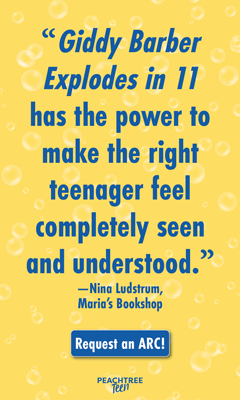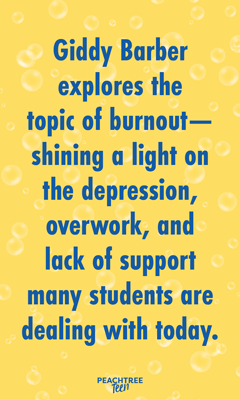Giddy Barber Explodes in 11
by Dina Havranek
An overburdened teen embarks on a self-improvement experiment--at times fascinating and hilarious, at others disastrous and heartbreaking--in Dina Havranek's profound and compulsively readable YA debut. Giddy Barber Explodes in 11 is an exemplary portrait of the unsustainability of high expectations, a brilliant look at how depression and stress manifests in teens, and a rallying reminder that they can ask for help.
Fifteen-year-old Giddy Barber does it all. She wakes her 14-year-old brother, Dougal, in time for school. Toasts waffles for her insatiably curious sister, Tigs, age five, and mischievous brother, Tad, age seven. Lets the dog out. Unclogs the toilet. Notes the number of eggs left in the refrigerator (none). Chaperones everyone to the bus stop, then bikes to her school, arriving late. All of this requires a morning meal of bland rice, an antacid, and some ibuprofen, as well as naps in class and strategically half-assed assignments. This mundane everyday has her weighed down by a "nothingness," unable to "remember the last time she smiled." Until she spots a post on a self-help website: "Have you tried opposition therapy?" Giddy, after reading how the therapy suggests doing the opposite of everything one would normally do, decides to give it a try.
For 11 days, Giddy reverses all her habits, leaving a flummoxed Dougal in charge and directing the clever flippancy with which she's approached her worst classes toward her best ones. The fallout is instantaneous. "You can't be depressed!" one of her friends tells her. "That's Jess's thing." Giddy's mother, vexed that Tad and Tigs missed school, wonders aloud, "Do I have to do everything around here?" And for her flattened clay art piece--a "dinner plate"--Giddy earns an F. All she can do is mentally repeat the website's advice: "Do not waver, even though at times you may not like who you become." This last bit, however, comes close to breaking Giddy as she veers toward the titular explosion.
The novel artfully portrays a teen girl at the brink of a breakdown. "There's no reason it always has to be me!" Giddy shouts at one point, exemplifying the frustration teens experience when they must bear responsibilities that they know should not be theirs. Havranek never cartoonishly villainizes Giddy's parents, instead displaying acute cognizance of how parents are often reliant on their competent children. In one gutting scene, Giddy expects her orderly father to attend to her horribly scraped face, "but all he does is hastily slap the bandages on" and return to his computer. Giddy's mother constantly reminds Giddy of all she must do: "keep better track of Dougal"; "Dammit, Giddy... you can't oversleep"; "This thing you're doing, this 'life experiment'... please get it done soon." Her older brother, Jax, who is in college and almost never home, advises, "Just suck it up for a couple of years and you'll be out too." But the word "no" eludes the dutiful Giddy.
Havranek effectively generates an atmosphere of investigation and self-discovery by using a third-person perspective that places the reader at a distance, similar to Giddy, who views herself as an experiment. An action figure named Superdoo that Giddy seeks out after watching an old home video enforces the idea of her examining herself: he breaks constantly and she keeps picking up the pieces and reattaching them. For Giddy, Superdoo, irritatingly abrasive in her pocket or grinning at her with his "eternal can-do attitude," is a reminder that something must change; for the reader, he symbolizes how things keep falling apart when the underlying problem is never fixed.
Giddy is not entirely without support, much of which she discovers through the experiment itself. Her lunch group of in-fighting girls to whom she is nothing "more than text message fodder" is swapped for a more receptive crew, adding beautiful glimmers of budding friendships. Abundant heart also comes from the undeniably adorable Tigs and Tad, a pair of angelic heathens, written into full being.
Havranek's immense attention to every detail begets a novel thoroughly true to life. A refreshing amount of time is spent in the classroom with Giddy, an acknowledgment of the large role school can play in teens' lives. Striking parallels occur between class material and Giddy's struggle. In world history, the teacher speaks of trench warfare, of "how soldiers tried their best at first but slowly tired over time," and Giddy thinks "Why'd they keep trying? Why didn't they just roll over and fall asleep?" She reads Hamlet and "The Yellow Wallpaper" in English and concludes that "maybe if everybody had just shut up and minded their own business for ten minutes, Hamlet and Jane would have come through everything OK. But nobody let them do that!"
Parallels also arise with the opera music Giddy listens to, which syncs with her emotions at critical moments ("She stomps to school to the sonorous rise and fall of the singer's baritone in an aria loaded with ominous foreboding"). Impressive turns of phrase throughout evoke Giddy's keen intellect and shifting ways of thinking ("Her brain's exhaustive leaps of acrobatics fall flat under the repeated thwack of reason and conclusion's gavel"). The result, shown through one girl's emphatically earnest and deeply impactful journey toward figuring herself out, is a reverberant narrative of how depression can waylay the most reliable of teens. Giddy Barber Explodes in 11 is a stirring, sensitive, yet jocular story told with poignancy and heartwarming sincerity. --Samantha Zaboski








